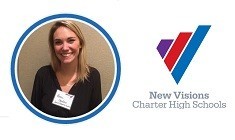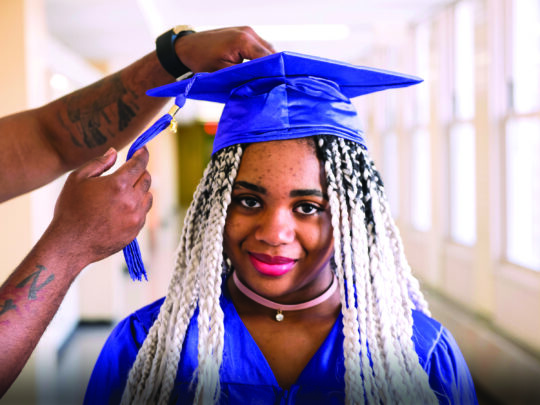Blog

Anna Spoden is the Special Education Coordinator and 10th and 11th grade ELA Special Education Teacher at New Visions Charter High School for Advanced Math and Science III (AMS III) in Brooklyn, NY. Her school has approximately 400 students in 9th-11th grade. Anna helped launch the school’s literacy intervention program in the school’s first year and has since expanded the program to support all grade levels. Below you will find a heart warming Q&A with Anna on how she has implemented the program and changed the lives of several of her students.
Q: Tell us a little bit about yourself.
Hi, my name is Anna Spoden. I joined Teach for America and moved to New York City immediately after I graduated college in May 2013, and I was hired by AMS III in July 2013. I’ve worked as a special education coordinator, and now in my third year at the school, I am also teaching 10th and 11th grade ELA.
Q: Tell us about the literacy intervention program you use.
My personal experience is with the Wilson Reading System (Wilson). Wilson is intended for students with dyslexia and students who struggle with decoding written words. Students who could benefit from Wilson are often reading below a third grade reading level and struggle with sounding out words letter-by-letter. Wilson approaches literacy from multiple modalities, allowing students to interact with the decoding process through writing, reading, sound cards, tapping, and magnetic boards. Wilson has 12 steps that take students from basic 3 letter closed-syllable words to complex, multisyllabic words. All of Wilson’s lessons are scripted, which reduces planning for teachers and allows more time to to focus on specific student needs.
Q: What types of literacy intervention do you offer your students and how are the types different?
We offer the Wilson Reading System, Just Words, and READ 180. Each of these interventions addresses different student needs. Wilson is intended for the “lowest readers” who struggle with decoding and have a lexile (comprehension) level below 780L. Just Words is more accelerated version of Wilson for students with lexile levels below 1000L; it allows students to move through the program at a quicker pace. READ 180 is geared more towards students who struggle with reading comprehension and focuses on texts that meet students’ current individual lexile levels. We offer nearly all of our 9th graders READ 180 because it is helpful in bridging the gap between a middle school reading level and a Regents reading level.
Q: How do you identify students who may need literacy intervention support?
At the beginning of the year, all of our students complete the Performance Series test, which identifies each student’s lexile level. Once we compile all of the scores in a spreadsheet, we identify the students with the lowest lexile levels who then take the Word Identification Spelling Test (WIST) Assessment, which helps identify if the students struggle with decoding or not. Only students who struggle with decoding are a good fit for these interventions.
Q: Tell us a little bit about your experience with the intervention and how you have grown as a teacher?
The two students (let’s call them Shawn and Joe) we chose for the literacy intervention program in November 2013 were both reading at or below a first grade level. Shawn only knew the four consonants and one vowel in his name at the beginning of our intervention. These two students experienced very little success in their classes and lacked confidence overall due to their struggles with literacy. By February 2014, Shawn read his first sentence. The clear joy and relief in his demeanor after successfully reading a sentence on his own brought me to tears. I started to notice Shawn in his classes would tap out the syllables of words with his fingers and felt more confident participating in class discussions. Because I co-taught these two students’ other classes, I was immediately able to see the impact of the Wilson program in their course work.
In year two, I met with Shawn and Joe every day for an hour to work on Wilson. By December, Shawn was reading controlled paragraphs and beaming about his ability to understand the things he was reading aloud. I also taught them in ELA class and both Shawn and Joe began participating during socratic seminars, asking questions during class, and offering opinions during class discussions.
While Shawn and Joe still struggle with reading in year three, their confidence encourages them to tap out unfamiliar words and advocate for themselves when they need things read to them. As a teacher, there has been nothing more significant in my practice than the on-going growth I have seen from Shawn and Joe. Their growth is something that inspires me every day as a special education teacher to try every option possible to lead students to success. Their success is direct proof that special education interventions are successful and will change these students’ lives when the program is implemented properly.
Q: What feedback have you received from students and parents about the program?
At the end of last school year, Shawn, Joe, and I created a reflection on the year and talked about our goals for this year. Shawn said that since he moved to the United States in second grade, no one had ever sat down and asked him if he knew how to read until he met me. He was previously pushed from grade to grade without one educator attempting to work with him one-on-one to understand his struggles with decoding. Based on conversations with his mother, Shawn’s confidence and desire to learn has not only drastically increased at school, but at home as well.
Q: What changes have you seen in your students?
Joe has passed four Regents exams in the past year with above a 55, allowing him to be eligible for a local diploma. Shawn has passed 3 Regents exams and is also on track for a local diploma. They are considered two of the hardest working students in the school. In the 2013/2014 school year, Joe was a quiet, insecure individual who would lash out against students for bullying him and struggled to focus in class. Since then, Joe has gained confidence. All of Shawn’s teachers report that his grades continue to improve as he progresses in Wilson.
Q: What advice do you have for other educators looking to implement programs like these?
It is often difficult to implement literacy intervention programs due to low staffing. Most literacy interventions only work in extremely small groups (less than 5 students), which often makes schools hesitant to use special education teachers for those times. My biggest piece of advice is that it is worth the effort and resources.
In order to have a successful intervention, you must work to ensure student groups for literacy interventions are intentional and appropriately leveled. Avoid larger groups with multiple reading levels in Just Words and Wilson sections as this can lead to students losing interest or bullying. All of the testing and prep work that goes into intervention placement is worth it.
Q: Is there anything else that you would like to share with our readers?
I sometimes worry when I talk about my experience with Wilson that I may sound as if I am exaggerating the success of the program. Wilson doesn’t work if it is not done with the right students and if the script isn’t followed closely. But when you follow the steps and empower the students to understand the value of the program, it is life changing for the students.
My experience using Wilson with Joe and Shawn is one of the main reasons I am dedicated to working in education for the rest of my life. Students with disabilities often experience failure in school. It is difficult for teachers to understand their needs, which often leads to their needs not being met. Wilson is a program that can help teachers better understand and meet their students’ needs while helping build their confidence. On Shawn’s birthday last year, I asked him what the best part of this past year had been for him, and he replied that it was being in Wilson and getting better at reading. He said, “thank you,” and Joe agreed. Wilson may not be a panacea for all struggling readers, but according to Shawn and Joe, it has changed their lives forever.
To learn about open positions at New Visions, please visit our career page.


